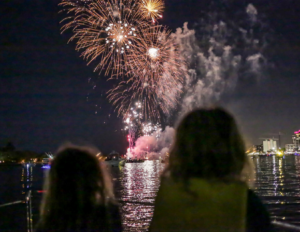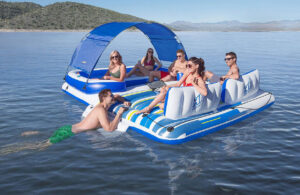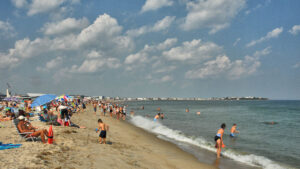One of the most adventurous activities you can do from your boat is to explore the wonderful world right beneath you via scuba diving. If you are not already certified in scuba, it’s easy to learn, and even children as young as 10 can get a junior certification, so the whole family can enjoy diving together. As a life-long diver and a scuba instructor of nearly 30 years, I know firsthand the combined pleasures of boating and scuba diving. Whether from our own boat or with a local dive operator, diving has allowed my wife Dori and me to more fully explore the areas we visit aboard our boat.
Many dive sites are accessible from your own boat or dinghy, but caution must be exercised when securing your vessel at a site. Due to the damage anchors can cause to marine life or to historic shipwrecks, anchoring is prohibited in many dive areas. Special dive mooring balls are frequently placed to secure your boat while diving. Consult local regulations about the use of dive moorings and remember to always fly a “Diver Down” flag when diving below your boat or dinghy.
Another option besides diving from your own boat is to go out on a local dive shop’s boat. Frequently, dive shops are located right in the marinas where you are staying, or they will come pick you up if they are nearby. And one of my favorite ways to dive is from shore. There are numerous dive sites you can enjoy just by walking in until the water is over your head. It’s amazing what you can see just within a few hundred feet of shore. Here are several of our favorite spots for visiting by boat and enjoying some world-class diving while there.
Tobermory, Ontario
The Great Lakes have more registered boats than any other area in the U.S. or Canada, and it’s no wonder, given the clear water and charming lakeside villages. That clear, fresh water we enjoy boating in has also created a divers’ dreamland by preserving the ships that have had the misfortune of sinking into it. Tobermory is one of the best boating and diving destinations in the world. Known as the Scuba Diving Capitol of Canada, Tobermory is home to the Fathom Five National Marine Park. Designated as a National Marine Conservation Area, the park was created to protect the rich maritime history contained beneath its waters.
In Tobermory, you have three choices: diving from your own boat; diving with a local dive shop; or entering from shore. Regardless of how you do it, you will experience firsthand the rich maritime history beneath the surface. Boating and diving in Tobermory are summertime activities, but the clear water and perfectly preserved shipwrecks are worth the effort during the area’s short season.
Dive Shops:
- Diver’s Den (519-596-2363, diversden.ca)
- G&S Watersports (519-596-2200, gswatersports.net)
Dockage:
- Big Tub Harbour Resort in Tobermory (519-596-2219)
- Tobermory Municipal Marina in Tobermory (519-596-2731)
Cape Ann, Massachusetts
Making an entry into the water from shore is one of the easiest ways to dive, but most of the East Coast’s shoreline is surf with little marine life, so entering from shore is usually not possible, nor is there much to see. Cape Ann is one of the exceptional areas in the region, where entries from shore are easy, the water is clear and marine life abundant. Cape Ann is a prominent point along the scenic coast of Massachusetts north of Boston. The nearby historic fishing village of Gloucester has numerous marinas and dive shops. You could dive for weeks, never stepping onto a boat or diving the same site twice. Like Tobermory, the water can be a little chilly, but a medium-thickness wetsuit will keep you comfortable in shallow water during the summer months. The sea bed near shore is very rocky, creating the perfect habitat for lobster, starfish and octopus.
Dive Shops:
- Cape Ann Divers (978- 281-8082, capeanndivers.com)
Dockage:
- Cape Ann Marina Resort in Gloucester (978-282-2116)
- Rockport Harbor in Rockport (978-546-9589)
Beaufort, North Carolina
The North Carolina coast from Cape Hatteras to Cape Fear is referred to as one of the Graveyards of the Atlantic — the other being off the coast of Nova Scotia — and each due to the number of shipwrecks and lives lost in these waters.
The shipwrecks off the North Carolina coast provide today’s recreational scuba diver a unique window into our nation’s maritime past and have become artificial reefs abundant with marine life. North Carolina has also sunken properly prepared ships to act as artificial reefs. The warm waters of the Gulf Stream are very close to North Carolina’s coast and with that come many of the tropical fish common in the Caribbean. Also, traveling from the north are the open-ocean pelagic species of fish, so on the same dive you can enjoy French angel fish, spotted moray eels and large schools of tuna, amberjack and Atlantic mackerel. I don’t know of anywhere else in the world where all these species can be seen in the water at the same time — and typically in 50 to 70 feet of visibility!
Diving in North Carolina is done only from a boat. You can anchor over many of the wrecks and reefs in your own boat or choose to join a local dive shop aboard one of their boats.
Dive Shops:
- Discovery Diving (252-728-2265, discoverydiving.com)
- Olympus Dive Center (252-726-9432, olympusdiving.com)
Dockage:
- Beaufort Docks in Beaufort (252-728-2503)
- Morehead City Yacht Basin in Morehead City (252-726-6862)
Southeast Coast of Florida
The coast of Florida from Fort Lauderdale north to Lake Worth Inlet at Palm Beach is closer to the Gulf Stream than any other area of the state. This means that the warmest, clearest water in all of Florida is along this stretch of shoreline. Centrally located Pompano Beach has become the hub of this active dive area, with numerous dive shops offering lessons, equipment and guided dives. Most dive boats in this area utilize Hillsboro Inlet to access the dive sites.
Recreational and technical diving along Florida’s east coast has developed into a serious business. Florida has sunk more ships as artificial reefs than any other state. Many are located in deep water for fishing enthusiasts and technical divers, but many are also in shallow water within easy reach of recreational divers. Dive sites can be accessed without problem from your personal boat, or you can dive with one of the local dive shops.
Dive Shops:
- Pompano Dive Center (954-788-0208, pompanodive.com)
- The Scuba Club (561-844-2466, thescubaclub.com)
Dockage:
- Bahia Mar Beach Resort & Yachting Center in Fort Lauderdale (954-764-2233)
- Hyatt Regency Pier Sixty-Six Marina in Fort Lauderdale (954-525-6666)
- Old Port Cove Marina in North Palm Beach (561-626-1760)
- Palm Harbor Marina in West Palm Beach (561-655-4757)
The Bahamas
The Bahamian islands are known to have some of the clearest, most beautiful water in this hemisphere. Due to its close proximity to the East Coast, the Bahamas have been a popular destination for boaters from the U.S. and Canada for many years. Diving from your boat or dinghy is very easy in the Bahamas, and dive shops are plentiful for renting equipment or refilling scuba tanks.
With over 700 islands, the Bahamas offers a wide diversity of dive sites, from shallow reefs and deep blue holes to dramatic walls full of coral and plenty of shipwrecks. The Bahamas has something for every type of diver. The inexperienced novice will find comfort and excitement in shallow water, with good visibility and plentiful marine life. The technical diver will find challenges and enjoyment in the region’s steep sloping walls and deep blue holes. The Abacos are best known for shallow, clear water. The southern shore of Grand Bahama has some amazing wrecks and some of the largest expanses of solid coral in the northern area. The Exumas are a little more remote, with pristine reefs. The Bahamas is working hard to keep its pristine quality by protecting its fragile coral reefs and marine life. At all dive sites, please observe local regulations to help preserve the underwater environment.
Dive Shops:
- Froggies Out Island Adventures (242-366-0431, froggiesabaco.com)
- Grand Bahama Scuba (242-373-6775, grandbahamascuba.com)
- Staniel Cay Divers (242-225-9668)
Dockage:
- Hope Town Inn & Marina on Elbow Cay in the Abacos (242-366-0003)
- Romora Bay Resort and Marina on Harbour Island (242-333-2325)
- Staniel Cay Yacht Club in the Exumas (242-355-2044)
The Florida Keys
The thin band of islands extending southwest from Miami is home to the only coral reefs in the continental United States. It is also the home of the 70-square-mile John Pennekamp State Park, located near Key Largo. This park is the first Undersea Park in the United States and is known for its iconic Christ of Abyss bronze statue.
Recreational divers discovered the Keys very early in the sport’s history, as early as the 1960s, and divers have been enjoying the underwater treasures ever since. On Upper Matacumbe Key, in the village of Islamorada, is the History of Diving Museum, which tells the story of mankind’s quest to explore the sea and has many cool artifacts and collections. Another major dive spot is General Hoyt S. Vandenberg wreck, located 7 miles south of Key West. This ex-military missile-tracking ship was sunk in May 2009 and is the second-largest vessel in the world to become an artificial reef. Diving is still an important part of life in the Keys. There is a dive shop on just about every key, and numerous dive guides have been published over the years describing all the best dive sites — and rules for enjoying them safely.
Dive Shops:
- Lost Reef Adventures (305-296-9737, lostreefadventures.com)
- Quiescence Diving Services (305-451-2440, keylargodiving.com)
Dockage:
- Conch Harbor Marina in Key West (305-294-2933)
- Faro Blanco Resort & Yacht Club in Marathon (305-743-948)
- Plantation Yacht Harbor Marina in Islamorada (305-852-2381)
- Postcard Inn Beach Resort & Marina in Islamorada (305-664-2321)





